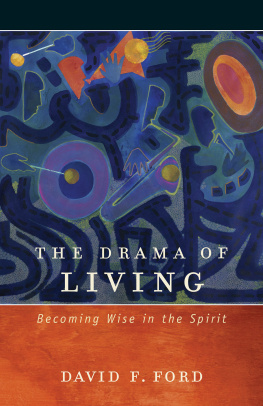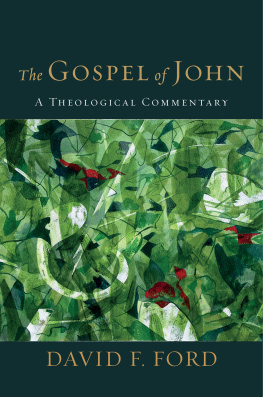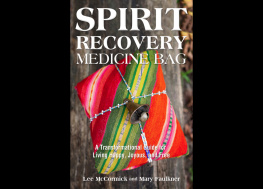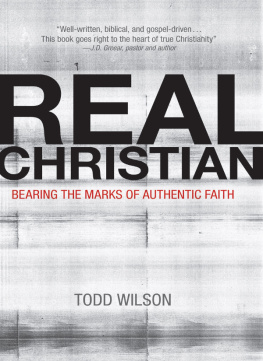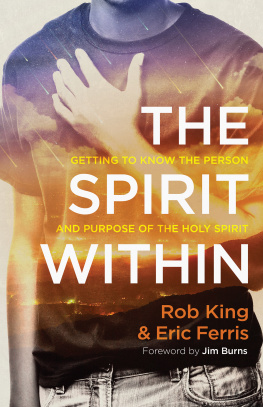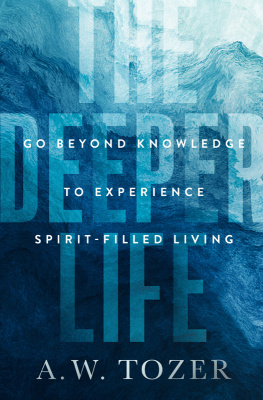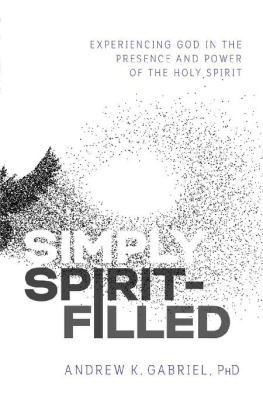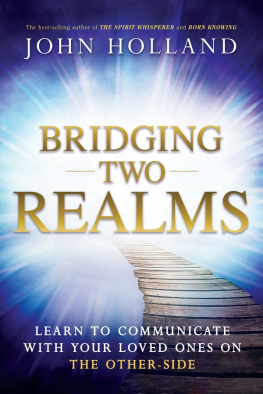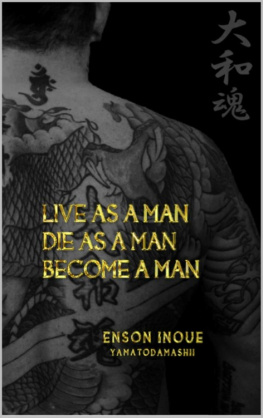David F. Ford - The Drama of Living: Becoming Wise in the Spirit
Here you can read online David F. Ford - The Drama of Living: Becoming Wise in the Spirit full text of the book (entire story) in english for free. Download pdf and epub, get meaning, cover and reviews about this ebook. year: 2014, publisher: Baker Publishing Group, genre: Religion. Description of the work, (preface) as well as reviews are available. Best literature library LitArk.com created for fans of good reading and offers a wide selection of genres:
Romance novel
Science fiction
Adventure
Detective
Science
History
Home and family
Prose
Art
Politics
Computer
Non-fiction
Religion
Business
Children
Humor
Choose a favorite category and find really read worthwhile books. Enjoy immersion in the world of imagination, feel the emotions of the characters or learn something new for yourself, make an fascinating discovery.
- Book:The Drama of Living: Becoming Wise in the Spirit
- Author:
- Publisher:Baker Publishing Group
- Genre:
- Year:2014
- Rating:5 / 5
- Favourites:Add to favourites
- Your mark:
- 100
- 1
- 2
- 3
- 4
- 5
The Drama of Living: Becoming Wise in the Spirit: summary, description and annotation
We offer to read an annotation, description, summary or preface (depends on what the author of the book "The Drama of Living: Becoming Wise in the Spirit" wrote himself). If you haven't found the necessary information about the book — write in the comments, we will try to find it.
The Drama of Living: Becoming Wise in the Spirit — read online for free the complete book (whole text) full work
Below is the text of the book, divided by pages. System saving the place of the last page read, allows you to conveniently read the book "The Drama of Living: Becoming Wise in the Spirit" online for free, without having to search again every time where you left off. Put a bookmark, and you can go to the page where you finished reading at any time.
Font size:
Interval:
Bookmark:

2014 by David F. Ford
Published by Brazos Press
a division of Baker Publishing Group
P.O. Box 6287, Grand Rapids, MI 49516-6287
www.brazospress.com
Ebook edition created 2014
All rights reserved. No part of this publication may be reproduced, stored in a retrieval system, or transmitted in any form or by any meansfor example, electronic, photocopy, recordingwithout the prior written permission of the publisher. The only exception is brief quotations in printed reviews.
ISBN 978-1-4412-1966-4
Library of Congress Cataloging-in-Publication Data is on file at the Library of Congress, Washington, DC.
Unless otherwise indicated, Scripture quotations are from the New Revised Standard Version of the Bible, copyright 1989, by the Division of Christian Education of the National Council of the Churches of Christ in the United States of America. Used by permission. All rights reserved.
To Micheal, friend of friends
Made, broken, and remade in love
Contents
Acknowledgments
There is a good deal of autobiography in this book, so the debts of gratitude are to most of the people who have been formative in my life from childhood onward. I cannot name them all, but some are especially relevant to the leading themes of the book.
The High School, Dublin, was my introduction to drama through Shakespeare, classics, and acting in school plays. Especially important were the Greek plays (performed in Greek!), both tragedy and comedy, that were produced annually by the headmaster, Dr. Ralph Reynolds, who also inspired a lifetimes interest in classics, the subject of my first degree at Trinity College Dublin. The superb department there included W. B. Stanford, Donald Wormell, Herbert Parkes, and John V. Luce. The tragedies of Sophocles made the strongest impression on me, but appreciation of the drama of living was also shaped by Homers Iliad and Odyssey , Herodotus and Thucydides, Aeschylus and Euripides, Socrates and Plato, Horace, Catullus, Ovid, Cicero, Virgil, Juvenal, Plautus, and Tacitus.
Having gone on to study theology and religious studies, I have often been grateful for this immersion in Greek and Roman civilizations, worlds of meaning hardly affected (in the periods covered by my courses) by the Abrahamic traditions that became principal concerns in later life. Something of the combination of strangeness, richness, and (at the cost of some hard work) accessibility has been transferable to intercultural and interfaith engagement today.
Perhaps the most profound encounter with drama was in the conversations with and writings of one of my doctoral supervisors, Donald MacKinnon. In his own words, he wrestled with reality at its darkest points and brought Greek and Shakespearean tragedy, the crucifixion of Jesus, and the Holocaust into probing, disturbing, and anguished engagement with each other. He speculated what Christian theology would have been like if in its formative centuries it had paid more attention to the tragedies of Aeschylus, Sophocles, and Euripides than to the philosophies of the Stoics, Plato, and Aristotle. In a little, indirect way, the dramatic take on the Gospel of John in this book is doing that.
I owe to Murray Cox and his coauthor, Alice Theilgaard (see chapter 6), a very different approach to Shakespeare through psychotherapy and neurology and also an appreciation of the work of Mark Rylance, not least in bringing Shakespeare to Broadmoor. I am also indebted to Ben Quash on drama and theology, to Sam Wells on improvisation, and to Giles Waller on Luther and tragedy.
As I began researching and thinking about a theological commentary on the Gospel of John, there was a six-month period during which I had twenty-one three-hour sessions, one on each chapter of the Gospel, with two ideal fellow readers, Richard Hays and Richard Bauckham. In addition, many others have studied or discussed John with me, including those students in the Faculty of Divinity in Cambridge who have taken the final year course on John. It is mostly impossible to say what I have learned from whom, but such joint study has been immensely important both in interpreting specific passages and in shaping an overall approach.
The practice of Scriptural Reasoning is a principal theme of chapter 2 and also figures in other chapters. It has been one of the formative influences in my life since writing The Shape of Living , and I am most grateful to all those who have helped in various ways to develop or sponsor the practice, including Ahmad Achtar, Nick Adams, Adam Afterman, Rumi Ahmed, Abdulrahman Al Salmi, Zainab Balogun, Barbara Bennett, Hanoch Ben-Pazi, Ayesha Chaudhry, Frances Clemson, Aryeh Cohen, Maria Dakake, Lejla Demiri, Miriam Feldmann-Kaye, Jennifer Fields, Emily Filler, Gavin Flood, Jim Fodor, David Frankel, Robert Gibbs, Tom Greggs, Usama Hasan, Hannah Hashkes, Rim Hassen, Mike Higton, Annabel Keeler, Steven Kepnes, Basit Koshul, Natan Levy, Miriam Lorie, Hilary Marlow, Yasmine Mermer, Rachel Muers, Aref Nayed, Peter Ochs, Chad Pecknold, Ben Quash, Randi Rashkover, Reuben Shank, Stephen Shashoua, Sarah Snyder, Laura Solomons, Sir Sigmund Sternberg, Lindsey Taylor-Guthartz, Susannah Ticciati, Muhammad Suheyl Umar, Isra Umeyye, Nargis Virani, Daniel Weiss, Tim Winter, Yang Huilin, You Bin, Simeon Zahl, and Laurie Zoloth.
The LArche communities are a theme of chapter 3 and also occur elsewhere. Since I was introduced to them more than twenty years ago by Frances Young, they have been a constant source of wisdom and prophetic challenge. On the international side, I thank Jean Vanier, Christine McGrievy, Jean-Christophe Pascal, Patrick Fontaine, Eileen Glass, George Durner, the participants from many countries in the retreat described in chapter 3, and many in Trosly-Breuil. Within the UK, I thank Michael Banner, John Bell, Christopher Bemrose, Rosemary Boyle, Hazel Bradley, Helen Brough, Ben Brown, Jude Brown, Stephen Conway, Clare Gardom, James Gardom, Judith Gardom, Lorraine Gelsthorpe, Katharine Hall, Lal Keenan, Anthony Kramers, Patrick McKearney, Mark Molloy, Ian Randall, Janice Randall, John Sargent, John Simpson, Sarah Simpson, Sue Simpson, Margie Tolstoy, Thrse Vanier, Rowan Williams, Hilary Wilson, and the first members of Lyns House in Cambridge, initiated by Deborah, my wife: Giulia Conto, Heather Leppard, Matthew Harbage, and Justin Youngchan Choi.
Deborah became associate priest at St. James, Wulfstan Way, in Cambridge shortly after this book was begun. Settling into this new parish community has been a very good experience for both of us and an encouraging example of the drama of ordinary Christian living. The weekly Eucharist at the center of its parish life could have been a lens for a good deal in the book.
My greatest single debt is to Micheal OSiadhail, not only for his poetry, which runs through this book, but also for discussions of each chapter and, above all, his friendship. The book is dedicated to him.
Others, too, have read all or parts of the book and made helpful comments, and I thank them: my wife, Deborah, and my children, Rebecca, Rachel, and Daniel; Jeremy Begbie, Jutta Brueck, Richard Chartres, Derek Fraser, Alan Hargrave, Annie Hargrave, Robbie Leigh, Christine McGrievy, Madeleine OCallaghan, Jean-Christophe Pascal, Claire Salmon, Martin Seeley, Margie Tolstoy, the Worster family, and Jean Vanier.
Natalie Watson of SCM and Bob Hosack and Lisa Ann Cockrel of Brazos Press have been exemplary editors, and Frances Clemson has been a superb research associate.
Introduction
This book has been a joy to write as well as a labor of love. It has drawn me deeper into the Bible, into Micheal OSiadhails poetry, and into life. The interplay of the three has led to rediscoveries, surprises, and fresh insights. My hope is that it might do something similar for readers who are seeking resources and inspiration for their roles in the drama of living.
Next pageFont size:
Interval:
Bookmark:
Similar books «The Drama of Living: Becoming Wise in the Spirit»
Look at similar books to The Drama of Living: Becoming Wise in the Spirit. We have selected literature similar in name and meaning in the hope of providing readers with more options to find new, interesting, not yet read works.
Discussion, reviews of the book The Drama of Living: Becoming Wise in the Spirit and just readers' own opinions. Leave your comments, write what you think about the work, its meaning or the main characters. Specify what exactly you liked and what you didn't like, and why you think so.

